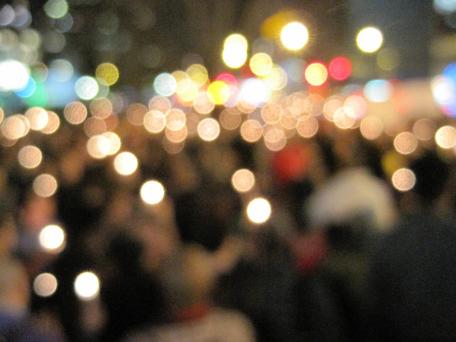While same-sex marriage is dramatically debated at the Supreme Court this week, it’s worth keeping in mind that just a few days ago, Colorado legalized civil unions for same-sex couples, becoming – to my surprise – the 18th state to have either marriage equality or civil unions. I didn’t realize the cause had come so far, but indeed it has. By my count, the nine states that have full marriage equality are Connecticut, Iowa, Massachusetts, Vermont, New Hampshire, New York, Washington, Maryland and Maine, plus the District of Columbia – and the nine states with civil unions or domestic partnerships substantially similar to marriage are Illinois, New Jersey, Delaware, Hawaii, Rhode Island, California, Nevada, Oregon, and now Colorado. Wisconsin has domestic partnerships which provide some limited rights.
With this much progress in such a short time, and with a non-negligible chance that we could win a historic victory at the court, it’s hard to believe that it was barely over three years ago that I wrote about how grindingly slow progress was in coming. It took a long time for the ground to start shifting, but now that it has, change is coming on faster and faster. Coloradans deserve commendation for their good sense, especially since Colorado is the headquarters of Focus on the Family (which predictably groused about the bill). Although separate-but-equal civil unions aren’t as good as one definition of marriage for everyone, they still represent a big step forward.
And if you look just a little bit further ahead, there are bigger victories on the horizon: polls consistently show that younger generations support gay rights by huge margins. With this in mind, I present for your reading pleasure this story about the delusionally optimistic young opponents of same-sex marriage, who still think they’ve got a chance to win this thing. What’s more, they intend to do it with the same arguments that are already losing:
“In redefining marriage to include same-sex couples, what you’re doing is you’re excluding the norm of sexual complementarity,” said Mr. Anderson, the Heritage Foundation fellow. “Once you exclude that norm, the three other norms — which are monogamy, sexual exclusivity and permanency — become optional as well.”
It goes without saying that this argument suffers from severe historical myopia. As anyone familiar with the Bible knows, monogamy wasn’t an essential part of marriage for much of human history; for centuries if not millennia, polygamy was perfectly normal and accepted. Similarly, the idea of racial segregation was often part of the definition of marriage until just a few decades ago, and again, widespread sexual anarchy didn’t result when this was struck down.
The definition of marriage has changed in countless ways over human history, evolving along with our conception of human rights and the changing view of relationships between the sexes. Why should we believe that today’s definition of marriage is an indissoluble package deal, except because of plain and simple bigotry?
Opponents of same-sex marriage say they realize they may lose the current fight, but they optimistically take the long view, pointing to Roe v. Wade, the 1973 Supreme Court case that legalized abortion. At the time, they say, opponents of abortion were told their cause was lost, but the fight continues 40 years later.
“If you take the longer view of history — I’m not talking just 15 years, I’m talking 40 years or even 100 years — I can’t help but think that the uniqueness of man-woman marriage will be adjudicated over time,” said Andrew T. Walker, 27, a policy analyst at the Heritage Foundation.
Now, there’s an obvious problem with this argument that its advocates refuse to grasp. There’s a very good reason why their quest is only going to become more difficult: namely, what they propose would necessarily mean forcibly dissolving existing same-sex marriages. And as more time goes by, as more jurisdictions legalize same-sex marriage, there’ll be even more of those marriages to break up, and the senseless malice of their position will become more and more apparent to everyone. (I suppose you could have a strange grandfather clause where existing marriages are left intact while new ones are forbidden, but that’s even less defensible under the principle of equality before the law.)
What made me smile was their acknowledging that if this issue is framed as a vote for whether or not gay and lesbian couples should be happy, they’ll lose every time. Since that manifestly is what this debate is about, they ought to recognize that their efforts are doomed. They claim that they need to argue “in favor of traditional marriage, not against gay people or gay rights”, which is transparently dishonest to anyone paying the slightest bit of attention. Do they think they’ll fool anyone by slipping a gay-marriage ban into the fine print?
Image: From a candlelight vigil in Union Square in 2009 for marriage equality. Photo by the author.
